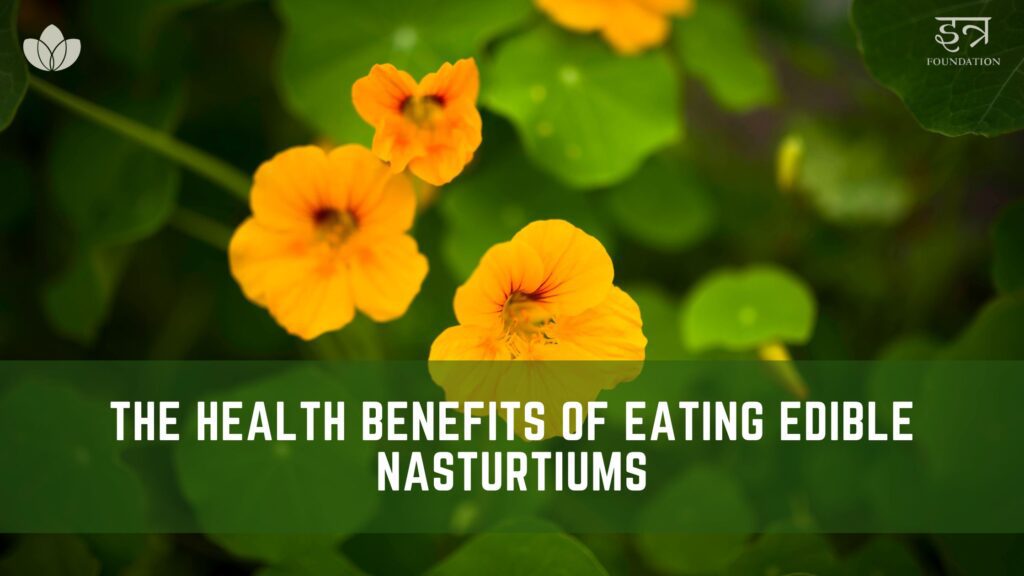Edible nasturtiums are a versatile and vibrant addition to any dish, with a unique flavor profile that can add a peppery, slightly sweet taste to both savory and sweet dishes. They are a popular choice among chefs and home cooks alike and are commonly used as a garnish or ingredient in salads, soups and sauces. However, what many people may not know is that these colorful flowers also offer a range of health benefits. In this article, we will explore the many ways in which eating edible nasturtiums can contribute to a healthier lifestyle, from boosting the immune system to aiding in digestion.


Nutritional Benefits of Nasturtiums
- Nasturtiums are a rich source of vitamin C, which plays a crucial role in maintaining a healthy immune system, supporting skin health and promoting wound healing.
- They are also a good source of vitamin A, which is essential for maintaining healthy eyesight and skin.
- Nasturtiums are packed with antioxidants such as lutein and zeaxanthin, which help protect the body against oxidative stress and reduce the risk of chronic diseases like cancer, heart disease, and diabetes.
- They contain significant amounts of iron, which is important for the formation of red blood cells and the transport of oxygen throughout the body.
- Nasturtiums also contain small amounts of other essential minerals like calcium, magnesium and potassium, which support healthy bone density, muscle function, and overall cellular health.
Anti-Inflammatory Properties
- Nasturtiums contain compounds with strong anti-inflammatory properties, including flavonoids, carotenoids and vitamin C.
- These compounds have been found to help reduce inflammation in the body, which can lead to a range of health benefits.
- Inflammation is the body’s natural response to injury or infection, but when it becomes chronic, it can lead to a range of health problems, including arthritis, heart disease and cancer.
- Studies have shown that the anti-inflammatory properties of nasturtiums can help reduce the risk of these chronic health conditions by lowering inflammation levels in the body.
- Additionally, nasturtiums can help boost the immune system, which can also aid in reducing inflammation.
Boosting Immunity
- Nasturtiums are known for their immune-boosting properties, which can help the body fight off infections and diseases.
- Nasturtiums contain high levels of vitamin C, which is a powerful antioxidant that helps to strengthen the immune system. Vitamin C also helps to stimulate the production of white blood cells, which play a crucial role in fighting off infections.
- Nasturtiums also contain natural antibiotics, which can help to prevent and treat infections. These antibiotics work by inhibiting the growth of harmful bacteria and viruses in the body.
- Nasturtiums also contain zinc, which is an essential mineral that plays a vital role in immune function. Zinc helps to activate immune cells and enhances the body’s ability to fight off infections.
- The immune-boosting properties of nasturtiums can be particularly beneficial during cold and flu season, as they can help to prevent and reduce the severity of these common illnesses.


Promoting Digestive Health
- Nasturtiums contain compounds that have a beneficial effect on the digestive system. For example, they contain glucotropaeolin, which helps to stimulate the production of digestive juices and enzymes.
- The plant also has a mild laxative effect, which can help to relieve constipation and promote regular bowel movements.
- Nasturtiums are also a good source of fiber, which is essential for maintaining a healthy digestive system. Fiber helps to keep the digestive system moving smoothly and can help to prevent constipation, diarrhea and other digestive problems.
- Additionally, nasturtiums contain antibacterial properties, which can help to prevent the growth of harmful bacteria in the gut. This can help to maintain a healthy balance of gut bacteria and prevent digestive problems caused by an overgrowth of harmful bacteria.
- Consuming nasturtiums can also help to reduce inflammation in the digestive tract, which can be beneficial for people with inflammatory bowel disease or other digestive conditions.
- Overall, incorporating nasturtiums into your diet can help to promote digestive health and prevent digestive problems.
Potential Anti-Cancer Properties
- Explanation of how some studies have suggested that nasturtiums may have anti-cancer properties due to their high levels of antioxidants and anti-inflammatory compounds.
- Discussion of specific studies that have found evidence of the anti-cancer properties of nasturtiums, such as a 2013 study that found that nasturtium extracts reduced the growth of human colon cancer cells in vitro.
- Mentioning that while the results of these studies are promising, more research is needed to determine the potential anti-cancer effects of nasturtiums in humans.
- Explanation of how eating a diet rich in plant-based foods like nasturtiums may help reduce the risk of developing certain types of cancer as part of an overall healthy lifestyle.


Culinary Uses of Nasturtiums
- Nasturtiums are a versatile and flavorful addition to many dishes. They have a slightly peppery taste that can add a unique dimension to salads, soups and sandwiches.
- The leaves, flowers and seeds of the nasturtium plant are all edible and can be used in different ways. The flowers are often used as a garnish or to add color to dishes, while the leaves can be chopped up and added to salads or used as a wrap for appetizers.
- Nasturtium seeds, also known as “poor man’s capers,” can be pickled and used as a condiment or added to salads and sandwiches.
- The bright orange and yellow flowers of the nasturtium plant can also be used to make a flavorful vinegar or infused oil.
- Nasturtiums pair well with other herbs and spices such as chives, thyme and garlic, as well as with other fruits and vegetables like strawberries, oranges, and beets.
- When cooking with nasturtiums, it’s important to use only the freshest flowers and leaves, as they can wilt quickly. It’s also a good idea to wash them thoroughly before use to remove any dirt or insects.
In conclusion, the consumption of edible nasturtiums provides a variety of health benefits, including boosting immunity, promoting digestive health and potentially possessing anti-inflammatory and anti-cancer properties. Nasturtiums are also a versatile ingredient in the culinary world, with uses ranging from salads to soups to sauces. Whether eaten raw or cooked, nasturtiums can be a valuable addition to any diet. So, next time you’re at the grocery store or farmers’ market, consider picking up a bunch of these beautiful and nutritious flowers to add a pop of color and flavor to your meals.






